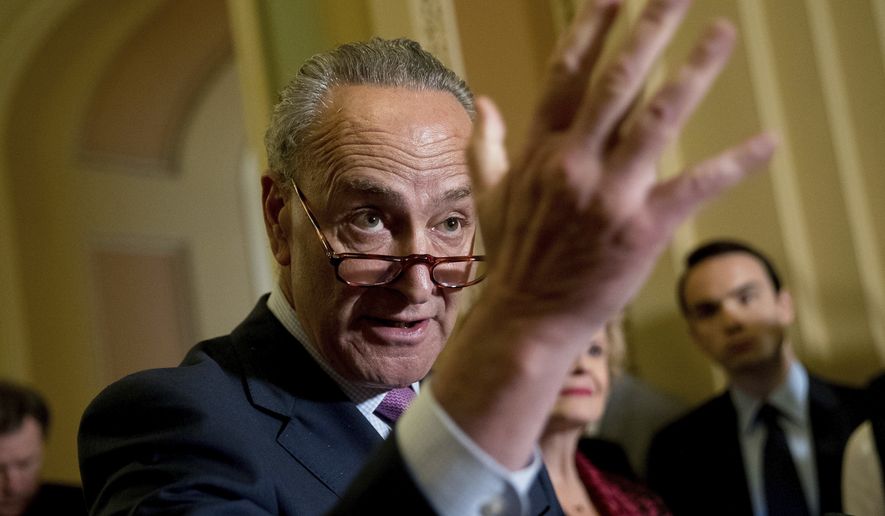Capitol Hill’s competing Russia-election meddling investigations boiled over as Senate Democrats blocked a closed-door hearing into possible Obama White House efforts to “unmask” members of the Trump presidential campaign, while the chairman of the leading Senate probe said he hoped to complete the panel’s work by the year’s end.
A planned Senate Judiciary Committee inquiry into whether Mr. Obama’s aides tried to improperly identify U.S. citizens swept up in intelligence surveillance of foreign targets was short-circuited after Minority Leader Charles E. Schumer invoked a parliamentary rule against holding committee meetings beyond the first two hours of the Senate’s day.
Former National Security Adviser Susan E. Rice and other top officials from the Obama White House have come under suspicion that they inappropriately asked to “unmask” American citizens, apparently trying to monitor the movements of President Trump and his top aides.
Committee Chairman Charles Grassley, lashed out at Mr. Schumer’s move.
“It’s disturbing and reckless for the minority leader to block the briefing,” the Iowa Republican said. “We’ve seen too many recent reminders of how unsafe the world is today. This is no time to play politics with our national security.”
Later Wednesday, Ms. Rice, who is black, charged that race and gender could be driving the scrutiny she is currently facing.
SEE ALSO: Senate Judiciary Committee to push for facts on alleged ‘unmasking’ by Obama officials
“Why me?” she said in a New York Magazine interview. “I do not leap to the simple explanation that it’s only about race and gender,” she added.
It was unclear when the unmasking briefing might be rescheduled.
Across Capitol Hill, at least five committees are currently conducting inquiries into Russia’s alleged role in influencing the 2016 campaign, possible ties between Mr. Trump’s presidential campaign and the Kremlin and Mr. Trump’s firing of FBI Director James B. Comey in May.
The investigations have bogged down Mr. Trump’s presidency, which has called allegations of Russian interference “a hoax” and a “witch hunt.”
Democrats initially argued that Mr. Trump and Moscow colluded. More recently they’ve focused on the possibility that Mr. Trump obstructed a Justice Department investigation by firing Mr. Comey and pressing key officials to exonerate him and drop their probes as well.
Mr. Trump’s defenders on Capitol Hill say the multiple probes have yet to unearth anything substantive and should conclude as quickly as possible.
One of the most bipartisan investigations, conducted by the Senate Intelligence Committee Russian probe, vowed to do just that on Wednesday, as its chairman said they hope to finish their work and issue a final report by the end of 2017.
Sen. Richard Burr, the North Carolina Republican, told reporters after Wednesday’s hearing that such a goal was aspirational but “can be done.”
His committee held a hearing considering Russian interference in recent European elections.
“We’ve got a very aggressive schedule in July,” the chairman said. “We may double the number of interviews by the time we leave for the August recess based upon our schedule.”
Thus far the committee’s investigators have interviewed “well over 40” people with plans to interviews nearly 90 before the August break, Mr. Burr added.
He also noted that its members would soon have access to the memos Mr. Comey wrote detailing his interactions with Mr. Trump.
The memos, which played a key part in the testimony of the fired FBI director before Mr. Burr’s panel early this month, include Mr. Comey’s claim that Mr. Trump asked the FBI to drop its investigation into former National Security Adviser Michael Flynn.
“I’ve got a commitment,” to access the documents Mr. Burr told Politico, but he declined to divulge who the agreement was with.
Currently, Mr. Comey and Department of Justice Special Counsel Robert Mueller are known to have the memos.
Testifying before the committee, international experts described extensive Russian interference in European elections and encouraged more awareness of the issue across the U.S..
Nicholas Burns, NATO ambassador and undersecretary at the State Department under President George W. Bush, criticized both former President Barack Obama and Mr. Trump for failing to address the problem with urgency.
“I do think that it’s time for Congress and not the president to lead the response to Russia’s cyberattack on the United States,” Mr. Burns said, adding that if Mr. Trump refuses to act, “it’s a dereliction of his most basic duty to protect the country.”
• Dan Boylan can be reached at dboylan@washingtontimes.com.
• Andrea Noble can be reached at anoble@washingtontimes.com.




Please read our comment policy before commenting.